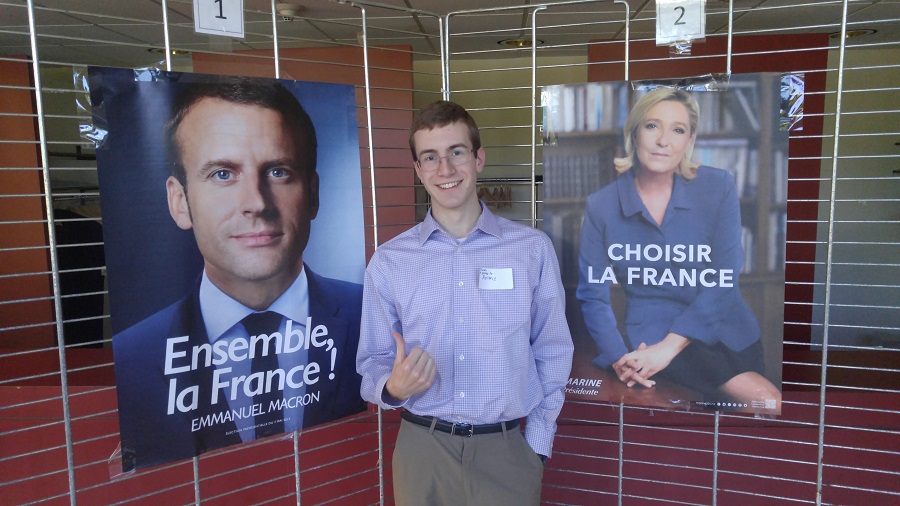Europe Retains It’s Infuriatingly Justified Moral Superiority
Posters at the French Embassy promote candidates for the French presidential election, Emmanuel Macron (left) and Marine Le Pen (right). Mr. Macron won a convincing victory on May 7th with just over 66% of the vote.
May 15, 2017
After Brexit and Trump, commentators around the world fretted about a “populist tide” sweeping the west, pushing out the traditional parties of the left and right and threatening the post-WWII international order itself.
But if there’s any tide to speak of, it’s low tide. Since November the parties of the extreme-right have been conclusively defeated in every major election across Europe.
First came the Austrian Presidential elections in December, where we were warned that the collapse of the European Union would begin with the election of the neo-fascist Norbert Hofer. It didn’t happen. Instead he was handily beaten by Green Party candidate Alexander Van der Bellen, a man who is perhaps the very opposite of a right-wing populist.
Then in March came the Dutch General Elections. Here we were promised that the Netherland’s most prominent racist – and worst haircut – Geert Wilders, would be Europe’s first far-right head of state. Instead, predictably, the mainstream conservative Mark Rutte remained Prime Minister.
Finally the French Presidential Election was billed as the climactic battle between the far-right and literally everyone else. And despite the media circus surrounding Marine Le Pen and her quasi-fascist Front National the liberal centrist Emmanuel Macron won by a landslide last weekend.
And what’s next? Germany’s elections are months away and their right-wing populists the AfD are already collapsing, turning on each other and splintering into factions. Britain’s UKIP has essentially ceased to exist following Brexit, though in all fairness their primary objective of national self-harm is already complete.
Really what we’re seeing now is no different than what we saw during our own elections; as much as Trump complains about the media, CNN is the reason he got elected. In the fall of 2015 he was nothing more than a fringe candidate with some truly bizarre sound bites, but cable news hyped him up for ratings. His behavior was so bizarre, his proposals so outlandish, that people couldn’t look away.
That’s the problem with our media: They feed on crisis. They need to draw viewers and make money, so they hype up the worst case scenario. Every election, every international incident, is suddenly turned into some sort of existential threat. The problem is that it’s artificial, if it weren’t for disproportionate media attention, most of these fringe candidates would have no support at all. Trump, Brexit, Wilders, Le Pen, each is a monster of the media’s creation, a villain trotted out to boost ratings. But by stirring up trouble, they’ve instead invited disaster by losing control of their narrative. Maybe they simply overestimated the intelligence of the average voter, or maybe they simply didn’t care about the results. After all, Trump has been an economic windfall for the media; newspaper subscription and cable viewership is higher than ever.
But especially when it comes to foreign affairs, it seems like our media doesn’t have a clue what’s going on. Trump is despised everywhere but Russia. Even in the UK there are serious doubts about the wisdom of Brexit; in continental Europe people are rather less restrained in their criticism.
The fact is that Europeans do not think and vote like we do. This owes in large part to better systems of voting a representation, which offer more freedom of choice and mandate more compromise. Partisanship is less pronounced there than in countries like the US and UK which use the obsolete and polarizing First Past the Post method. And Europeans seem to have a longer memory; the European Union, after all, is the direct result of the efforts towards post-WWII reconstruction. Europe suffered greatly during the two world wars and the Cold War that followed; they are not going to vote for a party with clear fascist history like Le Pen’s FN, and while there’s a broad appetite for EU reform, few indeed look favorably on throwing away seventy years of progress.
So congratulations to my European friends, for consistently standing up for your values; for openness and internationalism, pluralism and respect for human rights, for your commitment to peace and progress. And if you feel a little smug, fine, you’ve earned that.







